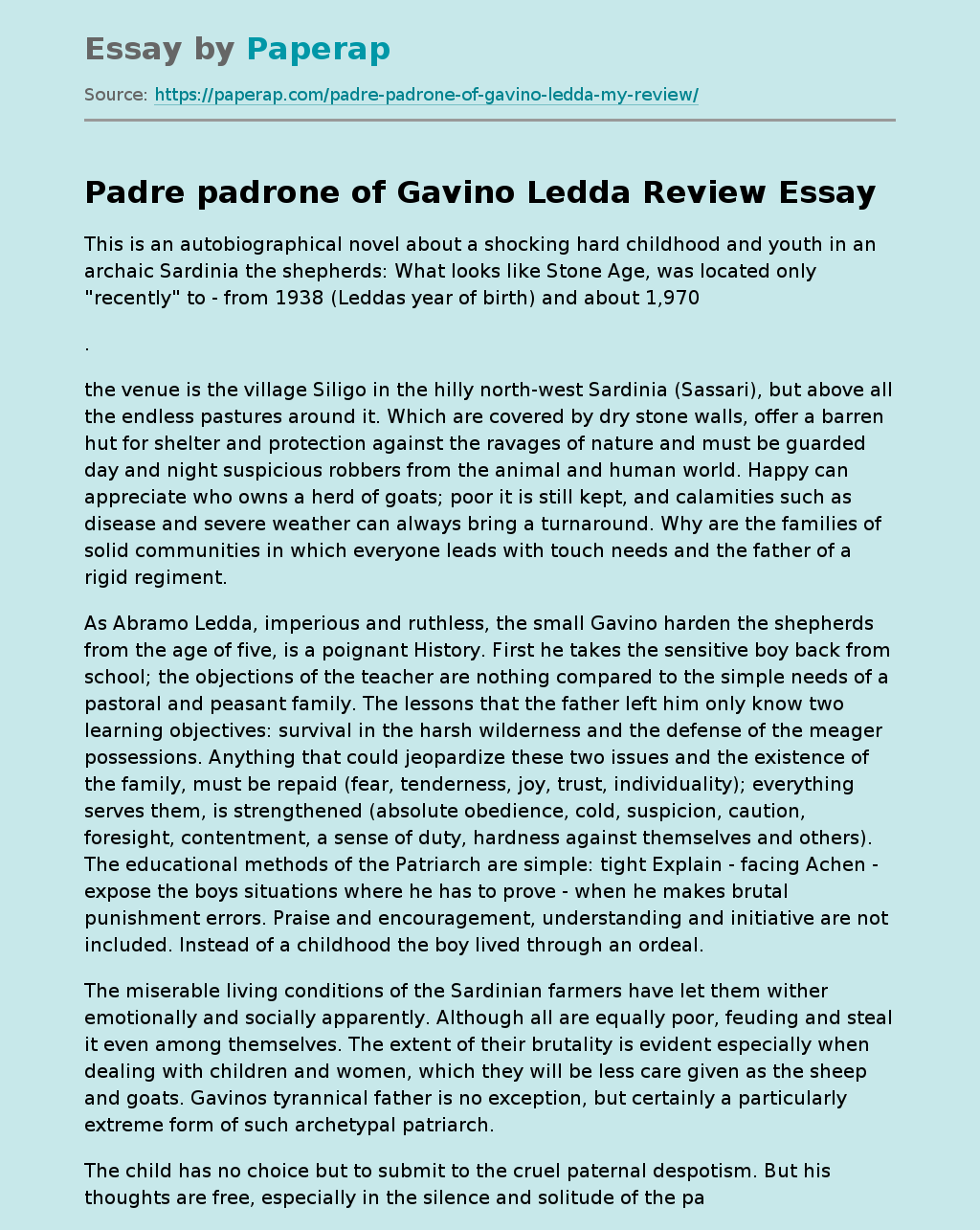“Padre Padrone” of Gavino Ledda
This is an autobiographical novel about a shocking hard childhood and youth in an archaic Sardinia the shepherds: What looks like Stone Age, was located only “recently” to – from 1938 (Leddas year of birth) and about 1,970 the venue is the village Siligo in the hilly north-west Sardinia (Sassari), but above all the endless pastures around it. Which are covered by dry stone walls, offer a barren hut for shelter and protection against the ravages of nature and must be guarded day and night suspicious robbers from the animal and human world.
Happy can appreciate who owns a herd of goats; poor it is still kept, and calamities such as disease and severe weather can always bring a turnaround. Why are the families of solid communities in which everyone leads with touch needs and the father of a rigid regiment.
As Abramo Ledda, imperious and ruthless, the small Gavino harden the shepherds from the age of five, is a poignant History. First he takes the sensitive boy back from school; the objections of the teacher are nothing compared to the simple needs of a pastoral and peasant family.
The lessons that the father left him only know two learning objectives: survival in the harsh wilderness and the defense of the meager possessions.
Anything that could jeopardize these two issues and the existence of the family, must be repaid (fear, tenderness, joy, trust, individuality); everything serves them, is strengthened (absolute obedience, cold, suspicion, caution, foresight, contentment, a sense of duty, hardness against themselves and others).
The educational methods of the Patriarch are simple: tight Explain – facing Achen – expose the boys situations where he has to prove – when he makes brutal punishment errors. Praise and encouragement, understanding and initiative are not included. Instead of a childhood the boy lived through an ordeal.
The miserable living conditions of the Sardinian farmers have let them wither emotionally and socially apparently. Although all are equally poor, feuding and steal it even among themselves. The extent of their brutality is evident especially when dealing with children and women, which they will be less care given as the sheep and goats. Gavinos tyrannical father is no exception, but certainly a particularly extreme form of such archetypal patriarch.
The child has no choice but to submit to the cruel paternal despotism. But his thoughts are free, especially in the silence and solitude of the pastures and hills, alone with the herd, wild animals drifting in the nights to mischief, and the adverse forces of nature. The few ideas from the classroom and his alert mind are driving him also to develop dreams and to pursue with admirable determination. The completely uncomprehending, unreasonable and unyielding father thrashes blindly and how the devil owned to his son and can not break his will.
The apparent loss of power by one arising rival who is not well but superior to him in physical strength of will-power and mental capabilities, brings the foundations of his worldview shaken, and he does not know to defend themselves other than by brute force a unhindered development into an independent character can only succeed to the boy if he escapes the reach of the tyrants and the best and the privation conditions of the island. This option promises Gavino Ledda the military.
Only on the “continent” (mainland Italy), he finally gets access to education and the modern world, to art and literature. Of course, he has to fight through to other stations of humiliation, because Sardinians were derided as uncivilized backwoods and had often learn Italian as a foreign language. In addition, the barracks was of course a renewed prison with strict hierarchical structures. But Gavino Ledda brings tirelessly reading, writing and mathematics in and successfully completes tests until he’s a radio technician and creates a degree.
He left the military and returned to his Sardinian home village. His hope that he would find there recognition of his achievements is, however, bitterly disappointed. The world of “padrone” has not developed; the talents and skills of the gifted son who is no value or benefit – on the contrary: Intellectual work is rotten for him around squatting. The father’s ambition is undiminished, and he still sees no other way for a son, but to submit and become a shepherd and farmer like his ancestors. The year is 1962. The final break between the two men is inevitable.
Inevitably one is reminded of the old legends of Greek mythology. The over nearly twenty years out of both sides relentlessly guided confrontation between father and son beats us well into the spell as the descriptions of the archaic backwardness of the island.
Since the book was published (1975) fascinated, touched and alienated the narrative million readers worldwide. 1977 largely verbatim in the dialogues, purist film won the Palme d’Or by the brothers Vittorio and Paolo Taviani at the Festival in Cannes. In 1978, the German translation appeared ( “My Father, My Lord”). In the original, the author adds his Italian text sometimes by the appropriate phrase in the Sardinian language, which is very revealing. The German translation leaves fortunately this procedure, although of course the direct comparison with the Italian lost
In the narrative glosses over his childhood and youth Gavino Ledda nothing -. Not the living conditions at the level of animals, not the bestiality of people, not brute force, not the sexual needs, not the existential fears. Therefore, we take his book on much more basic, hard-hitting looser way than the novels of other great Sardinian writer with comparable topics – such as “Diario di una maestrina” by Maria Giacobbe.
“Padre Padrone” of Gavino Ledda. (2019, Nov 18). Retrieved from https://paperap.com/padre-padrone-of-gavino-ledda-my-review/

